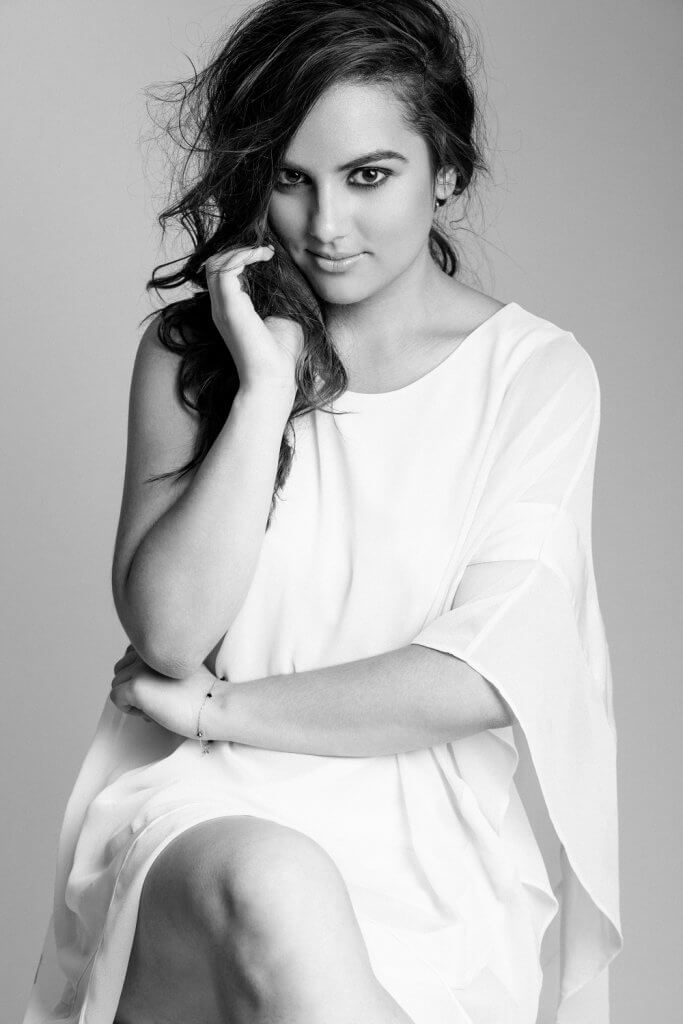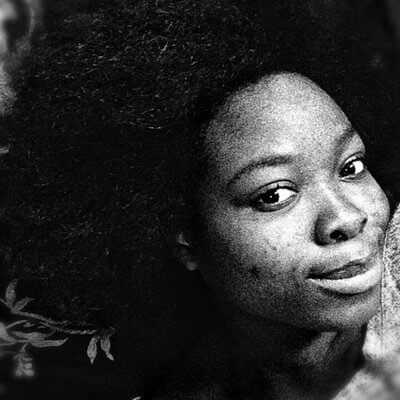Joelle Charan strives to contribute to the healing of Indian-Surinamese collective injury by fusing east and west in her musical style. Following the example set by her parents, who blended eastern and western ideals in their home, she hopes her music will help to break the cycle of prejudiced attitudes which are still too prominent in today’s society.
Born and raised in Amsterdam to a Catholic mother and a Hindu father, Joelle is empowered by her mixed heritage and religions. Her father is a descendant of indentured labourers from northwest India who worked under harsh conditions in Suriname following the abolition of slavery. Joelle has reclaimed the surname ‘Charan’ after her family’s original surname, ‘Goercharan’, was misspelt by a municipal official as ‘Goercharn’ upon their arrival in Amsterdam from Paramaribo, Suriname. With its correct spelling, ‘Charan’ means feet of the Lord, a name of honour which she celebrates in her identity and music.
Joelle writes songs with a strong narrative. She captures her listener with descriptive lyrics that tell stories inspired by her Indian grandparents, her family’s hardships, and her adventures in New York. Joelle’s dreamy pop songs are infused with classical Indian elements for a sound which is both immersive and full of surprises.
Her new EP, Ashira, is grounded in a message of forgiveness and empowerment against hate and injustice. It’s a beautifully put together collection of songs exploring the inner depths of this singer-songwriter. Just as Joelle fuses ancient east and modern west in her sound to honour her own truth, the narrative in her lyrics offers a cathartic experience to those who listen, encouraging love and acceptance for oneself and others.
For Creative Girls: How was it like growing up in Amsterdam? What was it like having two parents from different backgrounds?
My mother is Catholic and my father is Hindu. My father is a descendant of indentured labourers from northwest India who worked under harsh conditions in Suriname following the abolition of slavery. I was raised in an open-minded home for which I’m ever so grateful. Neither of my parents imposed their faith in me. Instead, they taught me to educate myself and to form my own opinion through visits to museums, churches and Hindu temples. As a child, we took trips to the Vatican and Saint Peter’s Basilica in Rome but also to the Hindu temple Shri Swaminarayan Mandir in London. My parents read Christian stories to me as well as tales about baby Krishna. In our house, the same candle was lit for both beliefs and there were mutual respect and empathy for each other.
Yet I recall being bullied by my classmates who thought my skin had been painted on. They mocked me for not eating beef. As a child, I received an official letter in front of my mostly white peers, which informed me of my allochtoon status due to my father having been born in Suriname, outside of the Netherlands. The Dutch government has since stopped using this term because it carries negative connotations of lower status, poor education and involvement in crime, but its impact is still easily seen. The other children stared at me for days, it was weird.
Back then I didn’t understand. I thought it was cruel and unfair to treat me differently, but now I know it was just the system.
When did you know you wanted to sing and when did you begin to sing?
My parents had a piano when I was still in my mum’s belly. My dad used to play pieces by Chopin on it and that’s where my love for playing the piano comes from. When I was a baby, my mum recalls me recognising the same melodies he’d play. So I’d already listened to music before I was born.
During lower school, I hated singing in the obligatory school choir and mimed instead. My favourite teacher noticed that; she told me I sang beautifully and that I should take up singing lessons. I took her advice and over the years singing became my passion.
What is the inspiration behind your songs? Who are your influences?
I like to write songs with a strong narrative. I love when a song captures me with descriptive lyrics, so I strive to do the same. I’m often inspired by my family, the stories from my Indian grandparents and the hardships they’ve faced, but I also love to be inspired by snapshot moments on my travels. When I see a stranger, my mind wanders and imagines who they are and what their story could be. Musically, I draw a lot of inspiration from artists like Laura Mvula, Daniel Lanois and Lizz Wright. I like to write my dreamy pop songs, but infuse them with classical Indian elements for a bit of surprise.
How did your move from Amsterdam to New York affect you in the creative sense? What did you enjoy about New York?
When I graduated from the Conservatory of Amsterdam, I moved to New York to study at The New School for Jazz and Contemporary Music in Manhattan with generous scholarships from the prestigious Prins Bernhard Cultuurfonds and the conservatory itself. I moved there right after New Year’s and was taken by surprise by the worst snowstorm to have hit the city since 1997. The city was locked down for days: the subway froze in place, cars swept off the streets, even a visit to the grocery store around the corner seemed nearly impossible. Coming from the Netherlands, I had never experienced such a force of nature.
I remember that everybody around me started helping each other out of that mess. The homeless were brought into the warmth of the shelters by passers-by on the street, the laundry guy helped the cleaner get to work on time. I helped an old lady get across the street safely. When I fell into a big puddle of ice water, a stranger gave me dry socks. It became clear to me that despite its cold appearance, New York has a big heart. It was very special to be part of it.
It was an incredible experience, both personally and musically, which influenced my songwriting style. I found inspiration in all corners of the city and had a suitcase full of new songs when I returned.
I listened to your newly released E.P, Ashira, which by the way my favourite is I Believe In You. What does Ashira mean and how did it feel releasing your second E.P since Silhouette in 2018. Are there noticeable changes in your sound?
So nice to hear that I Believe In You is your favourite song!
Ashira means “I will sing” and I sing for my family, my friends and myself. My new EP is grounded in a message of forgiveness and empowerment against hate and injustice. It encourages love and acceptance for yourself and others.
I feel that my artistry certainly evolved in between Silhouette and Ashira. I grew infusing my heritage into my sound and bringing ancient Indian instruments into a modern context. I was also fortunate to work with some of the best Dutch musicians in the business. That experience taught me a lot. As a songwriter, I matured in telling the stories and narratives in my lyrics.
So far I’ve had very positive responses and I’m super happy with that.
Your kind of music is unique, how does it feel releasing a new type of sound that is a fusion of Western pop music with classical Indian instruments? How did you create this type of sound?
My musical style represents my identity and with it, I strive to contribute to the healing of Indian-Surinamese collective injury. My parents set a wonderful example blending eastern and western ideals in our home and by following them, I really hope my music can in some way help to break the cycle of prejudiced attitudes which are still too prominent in today’s society.
In recent years, I was held in custody at a US airport on the basis that I had a “different” surname. I try to respond to these types of discrimination with defiance. I feel empowered by my mixed heritage and religions and I want to celebrate that with my music. Indian musicians live a very spiritual and disciplined lifestyle which I find fascinating, so I look for a sound that emulates that healing and mystical quality.
Also, how does it feel knowing you have created a new genre of music?
It feels very empowering to develop a sound that celebrates who I am. To me, it feels like I’m no longer trapped by the injustices of my family’s past. My family had been indentured labourers working under harsh conditions in Suriname following the abolition of slavery. When they first arrived in Amsterdam from Paramaribo, Suriname a municipal officer misspelt their surname and my Grandmother still feels hurt by that. For my music, I have reclaimed our family name Charan with its correct spelling. I’m excited to introduce listeners to sounds that may be unfamiliar to them, and I feel a sense of freedom to look forward and dream of the future.
Have you encountered any difficulty or setback through your musical career and can you tell us about it?
Getting heard and noticed as an unsigned singer-songwriter is immensely difficult. Working in the music business is a long road, and finding a firm audience and fanbase takes time and dedication.
What is your creative process like, I.e. writing of songs, sound etc? How do you get into the mind space to write?
I usually write at the piano and sing while I’m composing. When realising the vision for my music, I enjoy complete creative control. For this EP I played and experimented with every traditional Indian instrument that you hear, arranged the string quartet and really took the lead in the studio. With full creative control, every song I create truly feels like my own and something I can be proud of.
How do you feel when performing and what is the best thing about performing?
No matter how different, music can bring people together. It is capable of speaking to a human being. In every religion and part of the world, music is heard when people are born and when they die. Music was a way for slaves to express their feelings, whether it was hope or grief. It can even bring an end to war. Music speaks to our deepest core and the most desperate desire of our hearts.
Performing is my favourite way to share my music with others. It is truly fulfilling to see how I can make people happy with my music. While performing I feel free to be me, to express myself.
Do you have any dedications besides music?
I love animals, reading, drawing, keeping up with the film industry, visiting museums and taking long walks in nature.
What does your typical day look like?
It usually involves writing new music, rehearsing with my band, sharing ideas and performing once that’s possible again. I also keep track of my e-mails and social media, work out and catch up with friends and family.
Are you currently working on new music and should we be expecting?
Absolutely, at the moment I’m working on new music for my third EP. I plan to release it in 2021/2022.
Follow Joelle Charan’s work on Instagram, Facebook, and her Website.

Find more of her works on Medium – Adeyele Adeniran and also on her Instagram @_adearo.






